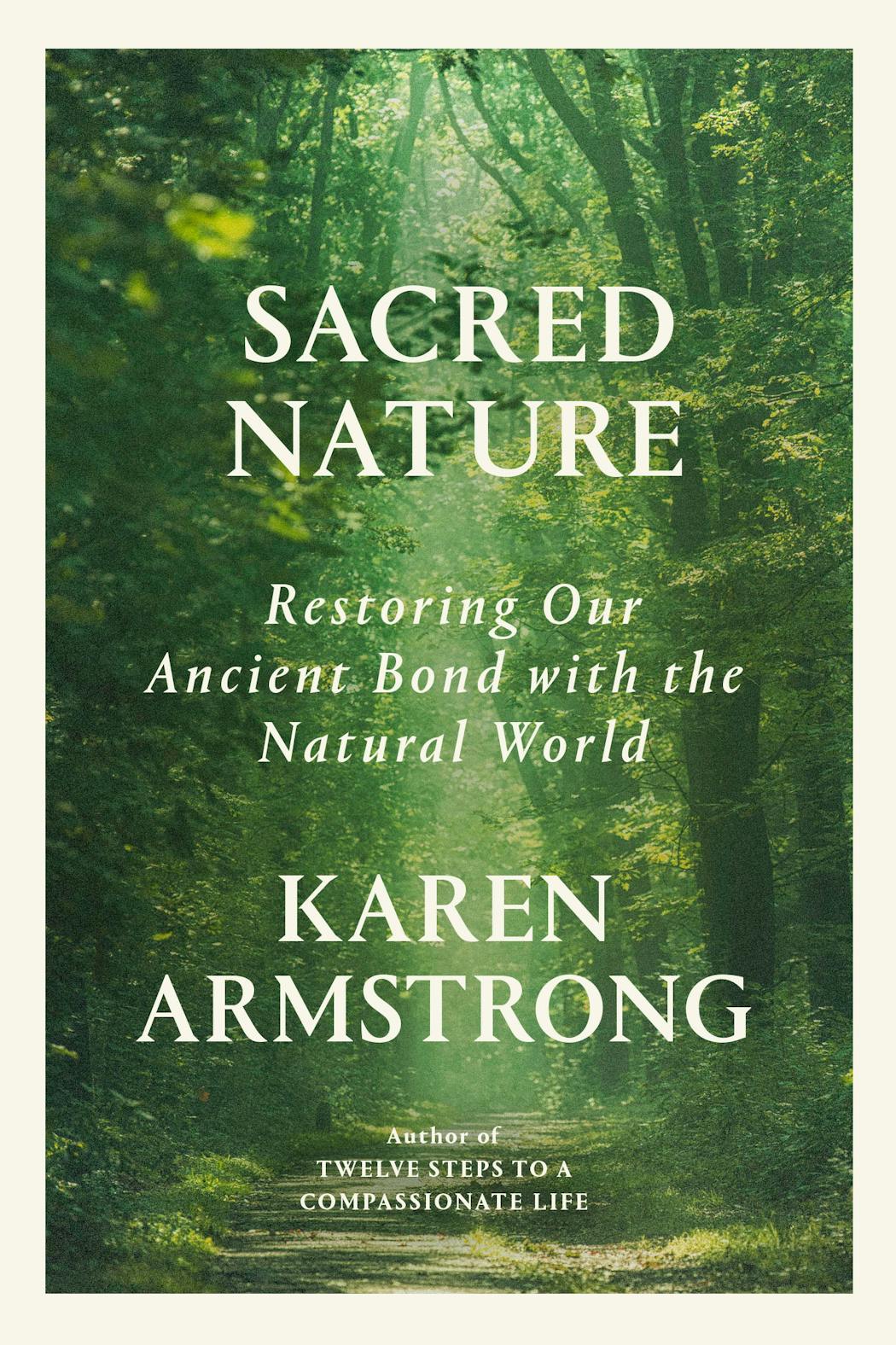Facts — even scary ones, about rising temperatures, extreme weather and a changing climate — tend not to move us emotionally.
That's why Karen Armstrong, the bestselling British author and scholar, former nun and three-time Talking Volumes guest, landed on a different approach, drawing from her wide-ranging research on the history of religion and nature. She wants readers to shift their beliefs — to take a new leap of faith.
In her latest book, "Sacred Nature: Restoring Our Ancient Bond With the Natural World," Armstrong sets out to show how past faith practices and teachings — from the ideas of Confucian philosophers to the poems of William Wordsworth, from the Jains' empathy for all living things to the words of a Muslim mystic — might help today to rebuild a reverence for and connection to the natural world and shake off indifference and inaction. Armstrong urges readers to see the divine not as a God in heaven but as an "inexpressible but dynamic inner presence that flows through all things."
Armstrong, who will be at the Fitzgerald Theater Sept. 14, recently talked to us about the golden rule, why "Sacred Nature" didn't turn out to be one of her "monster books" and why she loves to sit and watch the tree outside her London study.
Q: Why this book, now? Did climate change make it urgent for you?
A: Climate change was there, but initially I expected it to be one of my long, great, monster books, huge books. I'd done a lot of research and then discussed this on Zoom with all my publishers.
My agents and the publishers all said, "Look, make this short. Because people need not to feel intimidated by this book. People need to read it right now. Climate change is getting worse every day. We are heading for disaster. This is a book that's needed for the present times."
I then sat down and wrote this much shorter, snappier book. I might write a longer one later ... [In researching] the history of religion and nature I found extraordinary unanimity between them all. If you think of the way both the Chinese and the Indians, at about the same time, separated by thousands and thousands of miles with no contact with one another, both came up with this very similar idea of a God, not a God in heaven, as we have in the West, [but] as a force, a sacred force that permeates nature, that keeps us going, that's constantly roiling.
Q: How does this contrast with the West?
A: In both Judaism and Christianity, the emphasis is not on nature, but has been on events in history, like the great exodus from Egypt, or the life of Jesus that stood apart in a way, from us. It was [Francis] Bacon, who in the 17th century, says, it's now time for us in Europe who are beginning to subjugate nature, to do what God commanded Adam to do in the book of Genesis, where he says "Take the earth and subdue it."
Q: In each chapter, you include a section called "The Way Forward," giving actionable suggestions to think about or practice. Why was this important?
A: Our situation is very, very urgent. We hear about all these dreadful things, but our language is so scientific. It doesn't move us emotionally. And we're still going on, driving our cars and flying everywhere, even though we know it damages the environment and we can't afford to do these things. We've got to change people's minds and teach them step by step, to look at nature in a different way, because we don't look at nature these days. You see people in a beautiful setting just taking photographs or else chattering endlessly on their phones. And I see it, too, in the British Museum, where I'm involved in quite a lot. Instead of standing in front of something like the Rosetta Stone and saying, "Wow, this is the Rosetta Stone," you know, they just take a photograph of it and pass on. So there is a distance. We're preferring a virtual copy of nature to nature itself.
Q: How can these small steps make a difference?
A: We can only do this by practicing. We're not going to suddenly wake up one morning and see the world as wonderful, because it's outside our mode of thought. We're not going to really be inspired to try and sacrifice some of the activities that we take for granted unless we feel some massive affection for nature. We've got to start from scratch. We can't say, "Right, from this day on, I'm going to appreciate nature." Because we don't work like that.
The idea was to incorporate simple practices day by day, as the Chinese [neo Confucianists] did. They called it "quiet sitting," where you just sit and just watch nature. Turn your phones off. Sit 10 minutes a day to start with and look at the birds and the activities going on.
I've got, in my study, opposite me, a wonderful tree. Sometimes I spend a good 10 minutes just looking at that tree, because it's constantly changing color. You see all the creatures going in and out of it. And it's got obviously a life of its own, there's no relation, similarity to our own consciousness or life, but it has a life of its own. It goes green in the summer and it slowly withers in the winter, the sap sinking down into the earth. The world of nature outside us is teeming with life that we ignore, but which we are destroying day by day.
Q: I really enjoyed the section about the history of the golden rule. When my daughter's kindergarten teacher taught this to her class, she came home talking about it, and it was easy for her to grasp. How did it become a part of so many religious traditions, and how can it guide us now?
A: It's evolved in every single major world religion. Starting with Confucius in China in the sixth century. And he put it this way. He said, "Do not impose on others what you yourself do not desire."
And this requires you to get beyond your own selfishness and your own preoccupation with self, which we all have, look into your own heart, discover what gives you pain, and then refuse under any circumstance whatsoever to inflict that pain on anybody else. Do not impose on others what you yourself do not desire.
And Confucius said you don't just do it when you feel like it. Or occasionally. He says, all day and every day. All day and every day. And that, I think, is essential for the health of human society.
A couple hundred years after Confucius, the great Confucian Mencius said this has now to be also applied to nature, to what he called wanwu, the "ten thousand things" that are in nature. The myriad things that nature consists of. They are our companions. And we have to treat them as carefully as we treat one another.
Q: Have you found some readers respond with defensiveness to the ideas in your book?
A: Not yet. There may be a lot of Trump-like people who just think all this is rubbish. And I have no intention at all of changing their behavior. It is all the more urgent for the rest of us, who can see what's happening, to get people to change.
It's early days. Possibly because Christianity, at least in America, is the major religion there and doesn't emphasize nature so much, they may feel that it's virtuous to ignore it. But it really isn't. Even if you say God created the world, it's really very, very ungrateful of us to mess it up.
Excerpt from "Sacred Nature" by Karen Armstrong
While it is essential to cut carbon emissions and heed the warnings of scientists, we need to learn not only how to act differently but also how to think differently about the natural world. We need to recover the veneration of nature that human beings carefully cultivated for millennia; if we fail to do this, our concern for the natural environment will remain superficial. But this doesn't have to be an insuperable task, because despite our careless and destructive behaviour, we have not entirely lost our love of nature. Our poets still extol the beauty and mystery of the natural world and David Attenborough's wildlife documentaries continue to attract huge audiences. People flock to the sea for holidays and walk in the woods or in parks at weekends — a return to nature which is both pleasurable and restorative. Even in our large, polluted cities, people cherish their garden, a little oasis of nature in the urban desert. We should consciously develop this remnant of our primordial link to nature in our struggle to save the planet. It is essential not only to our well-being but to our humanity.
This will require imagination and effort. It is crucial that we behave differently not just when we feel like it, but all the time. Here the religious practices and disciplines of the past have much to offer. They can help us to develop an aesthetic appreciation of nature and to devise an ethical programme that will guide our behaviour and our thoughts. We must revive the reverence for the natural world that has always been essential to human nature but has become peripheral.
More about Talking Volumes
Talking Volumes is a literary collaboration between the Star Tribune and Minnesota Public Radio that brings high-profile authors to the Twin Cities for a live interview, later broadcast on MPR, accompanied by in-depth stories about the writers in the Star Tribune. Get tickets here.
Upcoming authors include: Celeste Ng, 7 p.m. Oct. 26. Dani Shapiro, 7 p.m. Oct. 28: Ross Gay, 7 p.m. Nov. 2.

The 5 best things our food writers ate this week

A Minnesota field guide to snow shovels: Which one's best?

Summer Camp Guide: Find your best ones here

Lowertown St. Paul losing another restaurant as Dark Horse announces closing



